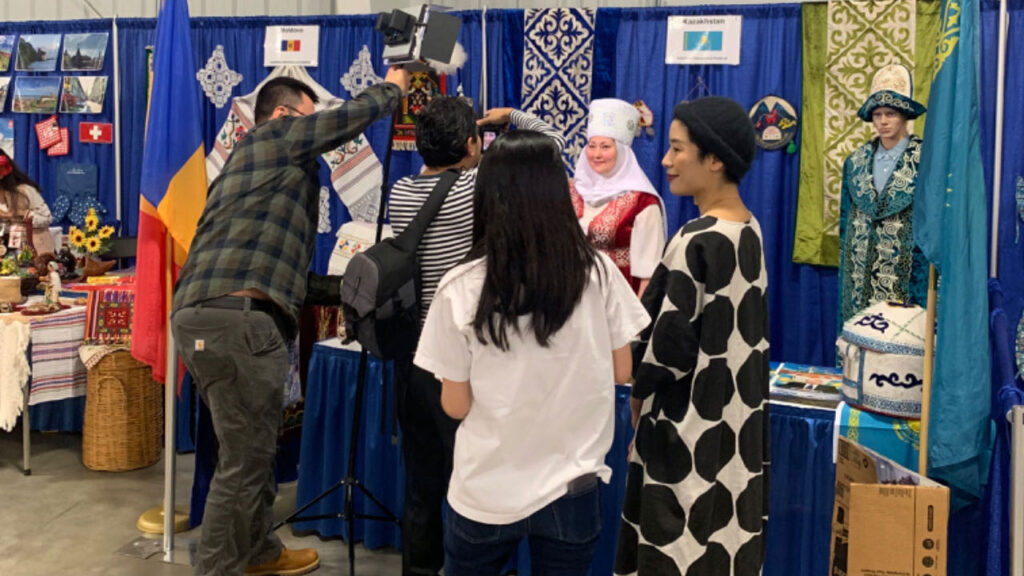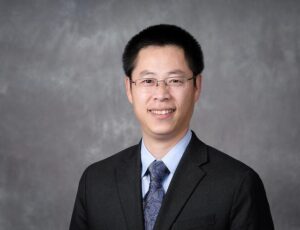Translating More Than Just A Language
Dr. Chaowei Zhu focused on developing servant leadership in his Interpreting and Translation Studies students and helped them advocate for people whose voices aren’t often heard.

When Dr. Chaowei Zhu lived in Columbia, South Carolina, a member of the local Chinese community was confused by a bill. There was a large monthly charge from AT&T, and the man, who didn’t speak much English, couldn’t figure out why. “He tried to save every penny,” Zhu says. “I don’t remember how high the bill was. But it was ridiculously high.”
Zhu instantly saw the problem: The man was being charged more than $100 a month on a combined bill including a security system that didn’t work. The battery had been dead for one or two years. So Zhu called AT&T on his behalf, got them to fix the system, and was also able to cut the security bill in half.
Years later, Zhu, who teaches in the graduate interpreting program at Wake Forest, thinks of that experience as he sends his students out for an internship. “A client can feel humiliated or upset because they don’t speak English,” he says. “An interpreter is a helper. It’s important that you show that you respect them.”
Zhu was the recipient of a 2022 Course Development and Redesign Grant from the Program for Leadership and Character. After going through the workshop, he thought about how he might focus on the servant leadership his students had displayed during their internships the year before. The result changed Zhu’s Organizational Behavior and Interpreting course. In it, students examine leadership and character, but part of students’ grade is based on a community service project. The goal of that project is to help community members with limited English proficiency to overcome communication issues caused by a language or cultural barrier. Students have 5 to 6 weeks to complete the community service and assess it.
The workshop that led to the course came as Zhu shifted how he thought about the role of an interpreter. He’d previously felt that the professional role of an interpreter was to be largely invisible. “They need you,” he says of an interpreter’s clients, “but you need to hide yourself.”
More recently, he has adopted a different perspective on interpreting. He emphasizes to his students that, when serving community members with limited English proficiency, student interpreters may wear multiple hats in their role. They are interpreters, but they can also be advocates, navigators, and friends. Interpreters can convey more than mere words, Zhu says. They can cultivate essential leadership skills and foster character virtues while serving minority communities.
Interpreters are in demand. A forecast from the U.S. Bureau of Labor Statistics (BLS) shows steady growth for the profession in the coming decade. As the makeup of the United States becomes more diverse and as globalization continues to increase, the role of interpreters will become more important. Even though advances in technology and artificial intelligence have made it possible to translate text or even audio more quickly, the BLS notes that “many of these jobs cannot be entirely automated because computers cannot yet produce work comparable to what human translators do in most cases.”

Zhu is leaning into that human side of interpreting. It comes partly from practicality. “Spanish-translating students do more health care interpreting,” he says. Placing interns at Atrium Health Wake Forest Baptist Hospital makes sense. There is a genuine need for interpreters in hospitals, clinics, and doctors’ offices in a state where 1 in 10 people now identify as Hispanic. “But for the Chinese-English interpreters, that’s a little bit more difficult to do because we don’t have many Chinese patients at Baptist hospital,” Zhu says. “So, we go to the Chinese communities in the Carolinas.”
That means interns do more than act as a bridge between two people who don’t speak a common language. “Sometimes interns help them perform simple tasks like help them make a doctor’s appointment, help them talk to a doctor, help them go to the hospital,” Zhu says. “They help them like a family member.”
Often, students are helping people do more than just translate an unfamiliar language. They’re helping them interpret cultural norms and institutions that may feel foreign to them and become advocates on their behalf. “My student told me about a Chinese gentleman whose family has no health insurance, so they always pay out of pocket,” Zhu says. “They try to avoid seeing the doctor as much as they can.” The man’s wife had an allergic reaction, and she ended up in the emergency room. “The bill was ridiculously high. But my student was able to call the health care provider and say ‘He’s paying cash out of his own pocket.’ They were able to bring the bill down by 40 percent. And this shocked a lot of folks in the community because they had no idea this was doable.” In China, hospitals are owned by the government and can be seen as powerful and inflexible. “Some of those community members assume that you have to pay every penny. But you can negotiate if you cannot afford it. You can have a payment plan.”
Helping a family navigate an institution they’re not familiar with as an advocate is an example of the servant leadership that Zhu is trying to instill in his students. It involves helping communities have a voice in a place where their language presents a barrier. “A lot of state lawmakers have proposed bills forbidding citizens from certain countries from purchasing property,” he says. Chinese nationals who hold U.S. visas, for example, are banned from owning property in several states. “It takes a long time for Chinese citizens to become naturalized as U.S. citizens, maybe 10 or 15 years,” he says. “They pay taxes. They abide by the law.” While the U.S. and Chinese governments have been at odds, its citizens are caught in the middle, and Chinese communities often can’t advocate for themselves in English. “They think it’s discriminatory. So some of my students are able to help some of these community members with limited English proficiency express their opinions, to get their voices heard through the local media and at hearings.”
The help that interpreters provide also comes with humility. “One thing I tell my students is: Do not think that you are the savior,” Zhu says. “Don’t think they cannot survive without you. Remember, they’ve been here forever. They’ve survived for 20 years. They built a life and raised a family here. But they just lack some of the language skills.
“One thing I tell my students is: Do not think that you are the savior.”
-Dr. Chaowei Zhu
“Students need to be humble. They need to recognize other people’s advantages and expertise. [Many community members] feel frustrated. They don’t speak of their needs. They have to rely on you to do some easy things in life. So make sure you’re extra respectful, extra humble. Practice your listening skills, your recognition skills. Make a compliment. Without humility and without the recognition of the needs that people have, I think people will not be your friend. They won’t want to talk to you.”
Zhu’s hope is that this work will spread to Wake Forest undergraduates. Eventually, he says, he hopes his students will take the humility, gratitude and empathy they employ in class to far-flung places. If individuals genuinely care, they will seek to understand the most effective ways to serve those in need, inspiring others to join in supporting less advantaged community members. “When WFU’s international students return to their home countries, they become future leaders,” Zhu says. “Learning to develop leadership skills here at Wake will benefit them throughout their lifetime.”
Learn more about grants for Wake Forest faculty and staff here.
